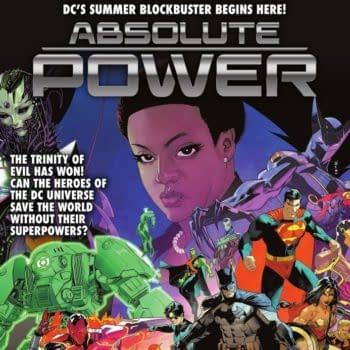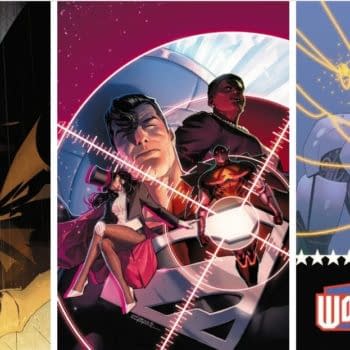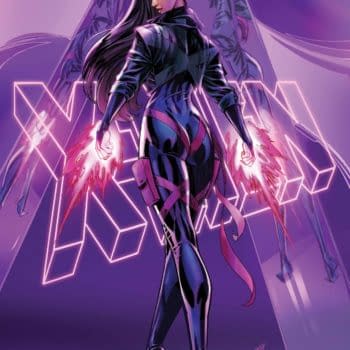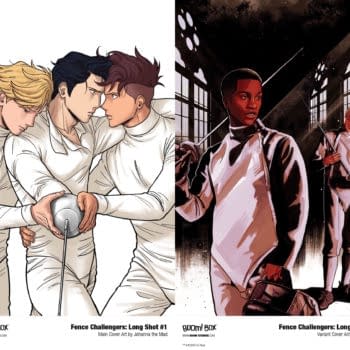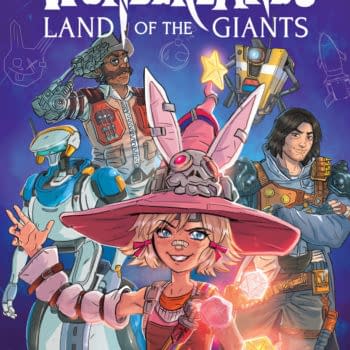Posted in: Comics, Recent Updates | Tagged: boycott, Comics, jack kirby, marvel, MVL, steve bissette
Steve Bissette Calls For Action Against Marvel Over Jack Kirby Case

So he's created a veritable manifesto for change, first on Facebook, then collated on his website, and answering his considerable critics in which he points out he is continually paid by DC for the co-creation of John Constantine, including a $45,000 cheque for the movie, while Jack Kirby and his estate continue to receive… nothing. Here's the majority of the text. And reminding us what one person dressed as Batgirl managed to do at San Diego Comic Con.
I put it to you, ladies and gentlemen, that San Diego Comicon 2012 should be the least comfortable event Marvel or any fleeting participant in any product, movie, videogame, or anything derived from Jack Kirby's Marvel legacy, should ever attend in the history of comicbook conventions—if you make sure it is.
But there's a lot to do—or rather, not do—between now and then.
After all, given the biggest news in the comics industry this week, in a vertebrate world, pros would cease working for Marvel and any Marvel product that involved Jack Kirby's co-creations or derivations of Jack Kirby's co-creations.
Fandom would cease buying/supporting any Marvel product, including its movies, in Jack's memory.
Then again, we live in an invertebrate world; in a vertebrate world, Marvel/Disney would not have so easily prevailed over Jack Kirby's heirs in seeking justice for Jack Kirby's legacy. Read it and weep; Stan Lee is damned. Thanks to Colleen Doran for posting about the verdict so succinctly and so promptly.
I voiced my immediate reactions on Facebook; some of what follows will be familiar to those who got involved in that conversation yesterday, or gave some of it a read.
I posted, among other thread kickers, "In the 1990s, fandom impacted Marvel sales with a loose "boycott" of Marvel titles over their gouging of the market with multiple covers, etc. Organized vertebrate fandom could deliver a hammer blow to Marvel again, over something of merit and meaning—the Kirby legacy, which informs damn near the whole of Marvel."
It's true: the 1990s, fandom impacted Marvel sales with a loose "boycott" of Marvel titles over their gouging of the market with multiple covers, etc. As I wrote in Teen Angels & New Mutants: Rick Veitch's Brat Pack® and the Art, Commerce, and Karma of Killing Sidekicks (2011), back in 1996, "Marvel fans, outraged by Marvel's interminable multiple "variant" covers and general beha-vior as a publisher (which severely affected the content of their comics), launched a "reader rebellion," boycotting Marvel product for almost a full year. Note that Marvel's market share had slid throughout their ill-fated declaration of distributor exclusivity, "from around 70 percent of American sales [in 1990-92] to 35 percent in 1995, then 25 percent to 1996…." [the latter quote cited was from Dan Raviv, Comic Wars: How Two Tycoons Battled over the Marvel Comics Empire – and Both Lost (2002, Broadway Books), p. 71]
Organized vertebrate fandom could deliver a hammer blow to Marvel again, over something of merit and meaning—Jack Kirby, the man and the artist, and his family, and the Kirby legacy, which informs damn near the whole of Marvel.
First of all, let's briefly note the depositions involved, including serfs (Stan Lee, John Romita, Roy Thomas, et al) essentially propping up the legal fiction of the entirety of Marvel work-for-hire.
Note that "legal fiction" is not my conceit, but rather an acknowledgement of the legal fiction at the heart of all work-for-hire legal concepts, language, and factual and contractual application of same since the late 19th Century.
I direct those of you who care to Catherine L. Fisk's excellent "Authors at Work: The Origin of the Work-for-Hire Doctrine," from the Yale Journal of Law & the Humanities, Vol. 15:1, linked here. Fisk writes in her introduction:
"One of the claims I make in this article is that the legal fiction of corporate authorship does what Lon Fuller suggested legal fictions always do. That is, it persuades lawyers that the corporate employer has a legitimate right to the copyright—the moral and legal entitlement that flows from the exalted status of being an author—without the necessity of explaining why. …it works as what Lon Fuller called an "intellectual shortcut" to persuade when a statement of the actual reasons for the ruling are difficult to explain." [Fisk, pg. 5; the reference to Fuller is citing Lon L. Fuller, Legal Fictions 9-19 (1967).]
The whole lockstep with Marvel policies reveals systematic presumptions and assumptions proffered as legal reality and legal precedent—though it is obvious to one and all that what Kirby did at Marvel was and remains, over half-a-century later, in and of itself exceptional, in that it goes far beyond what ANYONE other than Stan Lee did at Marvel, sans the nepotistic position Stan maintained.
That is what makes Jack's contribution/work for Marvel extraordinary, and above and beyond what Thomas, Romita, Byrne, or any other creator ever did before or after for Marvel.
A few key points:
* I don't question the legal logic Marvel's attorneys made, and the court decision reflects. However, nothing is being said about the conditions under which Kirby signed, and was pressured to sign, the contracts presented. I don't think "extortion" is too unfair a word to use, particularly in the very public case of the Marvel artwork "return" contracts.
That is a moral issue here, and Marvel's pattern of decades of effectively slandering, maligning, and dimissing Kirby and his legacy is, too.
* If, in the 1970s, Neal Adams and Jerry Robinson hadn't rallied around Siegel & Shuster, who had multiple signed settlement contracts with National Periodicals to wield against them, agreements they had signed over their lifetimes (agreements they and their legal reps—like Albert Zugsmith—had negotiated), nothing would have changed.
Adams and Robinson brought to the public the moral case, the moral outrage, over the treatment of the creators of Superman.
At that time, the legal matters were considered "settled."
C'mon, folks: Jack changed a century, the medium, the industry, our lives, and Marvel.
Let's change how the rest of this onfolding story goes.
* The very public pattern of undercutting Kirby's legacy as a co-creator of properties of great value to Marvel Comics (see Stan Lee's and Martin Goodman's revisionism on Captain America) dates back to 1947, and the first edition of Stan Lee's "The Secrets of Comics" pamphlet.
It's an old, old story; Walt Disney did it with and to Ub Iwerks.
Corporate media giants do it all the time.
It doesn't change the realities.
* The court transcript reveals how much scrambling Marvel is still doing to assert ownership; for myself, I can note that the endorsement "statement" on the backs of Marvel checks was easily dealt with by one bit of 1970s Yankee ingenuity: I didn't endorse that end of the check.
At my bank, I'd make a point of showing this to the tellers, asking if they wanted to witness the contract; they'd nervously decline, and grant permission for me to endorse the other end of the damned thing.
This comes down to fundamental legal issues not being raised, and the depositions read like serfs reasserting serfdom (for themselves and "fellow serfs" like Jack Kirby) with scrupulous unanimous toadying.
* One person in the Facebook conversation (who I won't name without permission) noted, "The $85 a page really struck me, too. When Fantagraphics was trying to get fandom stirred up to help Jack get his original pages back from Marvel, when Marvel had been gifting them to the water deliveryman and sundry, I just felt like 80,000 plus pages of Kirby artwork, they bled that man, and it wasn't enough for them. They want to strip EVERYTHING from him, even the idea that he was able to work without Stan Lee leading him by the nose…"
This leads me inevitably to the point that what's NOT being scrutinized is the 200,00+ pages Stan wrote WITHOUT Jack Kirby that yielded—what, for Marvel, in the long run?
Is there a single pre-1963 character scripted/co-created by Stan Lee apart from those forged in the Silver Age by Lee/Kirby and Lee/Ditko that have lasted as long, earned as much, or would be recognized by the public as characters known (at least by name)?
It is a fact that Lee wrote more pages than Jack ever drew for Marvel—but what Jack Kirby and Stan Lee co-created together still drives a multi-billion-dollar-per-year international industry that's now fueling new owner Disney and paying for the fancy lawyers to smugly blast Kirby's family into the courtroom dust.
* What to do?
I suggest, for starters, simply pulling the plug on all individual support for any and all Kirby-derived Marvel ANYTHING (comics, movies, videogames, merchandizing).
Now.
Today.
* This is step one, and something everyone who cares can do; but TELL your venue or retailer what you're doing and why.
TELL THEM what you're doing, and spend what you would have spent on Kirby-derived Marvel product on other product from other companies in their store.
If you're rightly concerned with continuing to support your local retailers, which I hope you are, let them know what you are doing and spend the same $$ you spent on Marvel product on other product, in the same store: it will continue to support your retailer, but send a clear message to Marvel in due time. If you are honor bound to follow through the pre-orders you've made to date (i.e., paying for/buying Kirby-derivative product incoming for the next three months because you pre-ordered it or have it held for you), proceed honorably and accordingly, but cancel all subsequent orders and spend your money with the same retailer on other product.
Again, you won't be denying your retailer income you, as a customer, provide.
Your dollars, your decision, will speak loudly.
The store will still earn your dollars, but you make your point.
Get creative.
Grow a spine.
* This goes for more than comic shops. One should also let the venue (comic shop, book shop, movie theater, Best Buy DVD display of superhero movies, etc.) KNOW what you're doing, and why.
Look, they won't care, first time they hear it, second time—they'll think you're crazy, likely as not—but hearing the same decision expressed again and again will eventually trickle up the chains of command.
Making clear what you are doing will cumulatively attract some attention, and since there's no sense of shame possible to conjure for a major corporation, hitting back with dollars NOT spent will eventually send a message.
Beyond that, we're all open for ideas, but above all—TAKE ACTION.
* This isn't "follow the leader" action: do it, or don't do it.
If you do it, you're doing it as an individual. Individual action takes on weight from cumulative individual action. The cumulative action will speak volumes, and not provide easy targets for Marvel attorneys (check current boycott laws; it varies, state by state, and can have consequences; but note, again, the effectiveness of the 1990s Marvel "boycott," which was felt quickly at the company, and to my knowledge nobody was sued by Marvel).
* Sure, go ahead, talk yourselves out of ANY action, individual or collective.
The corporations COUNT on that.
But remember her—one fan, at one convention:
* This also comes down to the messages the Marvel product—comics, movies, etc.—claim to espouse:
the need/ability of the individual to turn the tide against enormous odds and massive consolidations of raw power.
Jack Kirby always, in his life and in his work, trumpeted the power of the INDIVIDUAL to act against power. It was JACK'S message, in all his work: the power of the INDIVIDUAL to CHANGE THE WORLD.
So, CHANGE THE WORLD, those who grew up reading, loving, enjoying, creating, earning livings from Kirby's work and all that followed.
* Rationalizing NOT taking action is playing the corporate game.
___Speaking only for myself: I've had it.
I'm done with Marvel and all Marvel Kirby-derived product, period. No movies (I was planning to see Captain America this weekend; that's forever off the table), no more comics from their Kirby legacy, nothing.
Bringing greater public shame/pressure to bear may or may not yield results, but removing further investment in their exploitation of the Kirby legacy—which is, undeniably, 85%+ of Marvel's pantheon—will send a message.
It's not hubris (I know my nickel isn't anything of consequence), and it won't mean a thing if I'm the only one doing it, but I'm doing it.
If more do it, it WILL mean something.
Screw apologies to the Kirby family; Marvel needs to take care of the creator and the heirs of the creator that earns those lawyers their paychecks.
Kirby is dead; he went through the ignoble final years suffering Marvel's abuses and indifference.
Nothing can change that.
But we needn't continue to even passively support that system.
Jack was ill-served by Marvel and DC to the end. (I'm curious to know more about his DC legacy; Mark Evanier has written about those legal issues, which I'm going to do further digging on—but, again, it's just this Marvel legal decision that is absolutely public, and hence a clear turning point. Bob Heer noted yesterday during the Facebook conversation, "DC, at the very least, does appear to pay a reprint fee to the Kirby estate for any reuse of his work, and gives an actual "Created by…" squib for his 1970s characters. And apparently returned what artwork of his they had when that became standard without asking for onerous conditions. So that's at least three up on Marvel. Not that DC doesn't have major issues with many of their key creators.")
As for Marvel: if they'd simply pay the Kirby Estate what they pay to the lawyers behind this reprehensible stand, that would be more than Jack ever got from Marvel, and certainly more than the heirs receive.
Yes, I know: "and when pigs fly…"
No, the best we can build is what eventually arrives at the EW headline, "NEW MARVEL MOVIE TANKS DUE TO KIRBY OUTRAGE," down the road.
___________I woke up this morning to angry Facebook messages and email from Stan Lee apologists/defenders, and one work-for-hire "defender," accusing me of not knowing what I'm talking about.
Allow me to further articulate my decision to never buy Marvel in my life again regarding Kirby-derivative content…
1. Everyone is being glib about work for hire. The legal assumption, mirrored by the public assumption, that work-for-hire per se means no benefits or royalties shared is one of the most troublesome aspects of this legal decision.
As Bill Stout noted in a couple of interviews in the past (and I will lay hands on at least one of them this week to cite and quote, unless Bill himself weighs in publicly on this), one of the most successful of all comics publishers of the 1950s-early 1960s, Dell, then Gold Key (if only for their Disney license titles, until the superhero craze overtook Gold Key's sales), reportedly did pay royalties on some titles they published to creators like Russ Manning (Stout was citing royalties paid for Magnus: Robot Fighter).
Thus, even in the Silver Age, work-for-hire didn't per se meant NO creator sharing of income or royalties paid.
As any pro who worked in comics post-1984 can attest, both DC (first to announce a royalty plan) then Marvel (quick to top DC's) standardized both work-for-hire reprint fees and return-of-artwork (though Marvel wasn't as progressive as DC in the latter dept, which I can also attest to from hard experience) and royalties in the mid-1980s.
The legal assumption, mirrored by the public assumption, that work-for-hire per se means no benefits or royalties shared is one of the most troublesome aspects of this legal decision.
2. The only dog I have in this fight is the certainty, borne out by historic reality, that the ONLY period of Marvel that has fueled the entire dynasty that's generating the current cycle of movies is its Silver Age wellsprings, and that all but two of those (Spider-Man and Dr. Strange) emerged from Kirby's pencil.
This sets Kirby into a special, distinctive, and singular group of creators—including, yes, Stan Lee—whose creations remain the absolute bedrock of the Marvel empire, continuing to generate billions of dollars annually to pay attorneys like those who hammered the Kirby family in the legal arena this past year.
3. Again a matter of historical truth, Stan's been taken care of for almost his entire adult life by Atlas/Timely/Marvel; good for Stan.
Since (a) precious few of Stan's pre-Silver Age co-creations are currently splayed across international movie screens every summer, and (b) Stan was, after all, part of publisher Martin Goodman's family, can we all agree that nepotism was a factor in ensuring Stan was and remains the only Silver Age Marvel creator to enjoy lifelong benefits from his years of service, despite presumably working under the yoke of the same work-for-hire system wielded so mightily against the Kirby family?
4. Having first worked as a freelancer at Marvel in 1977, on the heels of the 1976 Copyright Act, I saw (and signed, limiting my work at Marvel by choice thereafter) the first contracts ever put in front of freelancers: a blanket "work for hire" contract covering ALL one's work for Marvel.
We were told, by Marvel editors and ass't editors (and, publicly, by Neal Adams), at the time, there hadn't been any contracts previously, and as I learned was typical at the time (by comparing notes with fellow freelancers), I was forced to signed under duress.
In my case (the story "Into the Shop," in Marvel Preview # ), I had been assigned a job, sans contract, that I completed in four weeks, on time, and was then presented with the contract and told I would not be paid, the story would not be published, unless I signed. The signature had to be delivered at that moment, in person, in that office (editor Rick Marschall's office), or I simply would not be paid. Since the collective rent for our house where Rick Veitch, Tom Yeates, John Totleben, and I lived in was entirely dependent upon my coming home with that paycheck, I signed.
It was a blanket "work-for-hire" covering all Marvel works, past, present, and future, one would ever do.
We know, for a fact, one of the Kirby contracts (the one he was forced to sign to implement the return of his original art) was signed under duress—why that wasn't emphasized or asked in the depositions, we'll never know.
5. One of those writing me this morning indignantly asked, "Were you there? How do you know what was and wasn't signed?" The rest, I only know what is in the recorded histories… but I know I'm not seeing a procession of Stan Lee characters that were not co-created by Jack Kirby and Steve Ditko making Marvel and contemporary movie history. I know 85% of everything Marvel has capitalized on since the Silver Age (including X-Men, which really owes its current incarnation to Len Wein and the late Dave Cockrum, who should have been and be earning from their co-creator work, too) was co-created by Jack Kirby.
6. I know I earn quarterly income from DC on the one character I had a hand in co-creating under work-for-hire contracts at DC Comics: John Constantine. I know I've earned more from Constantine than I have cumulatively over the years from my far-more-extensive Swamp Thing pencils, script, and cover reprint royalties. I know I received a check for $45,000 for just one movie based on the one character I co-created for the DC pantheon (Constantine), and can't help but wonder why it is Kirby never saw anything close to that in his lifetime. I wonder why it is that DC's comparatively progressive treatment, revising work-for-hire contracts willingly over time to take better care of its creators, isn't being waved in Marvel's legal team's faces.
7. I know the defenders of absolute unapologetic corporate ownership like those who challenged me via FB messages and emails have the power of the current courts behind them—so all that is left to mites like me is to NOT SPEND ANOTHER NICKEL ON MARVEL KIRBY-DERIVED PRODUCT EVER AGAIN IN MY LIFE, and encourage others to do the same.
8. Finally, I know for a fact that the revisionist history of Marvel began in 1947, in Stan Lee's Secrets of the Comics pamphlet, which asserted that Martin Goodman alone created Captain America.
Corporate shills and corporate histories—including, famously, that of Disney—depend upon belittling and excluding altogether the creative labors and works of those not on the throne.
His piece has three comments so far. I'm sure you have plenty to add…






